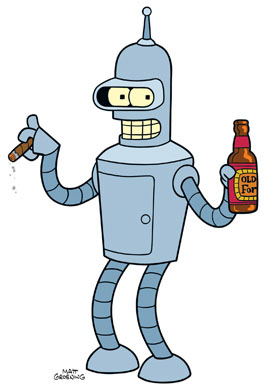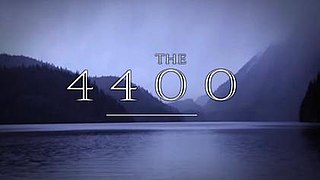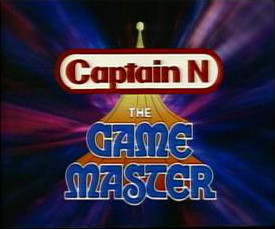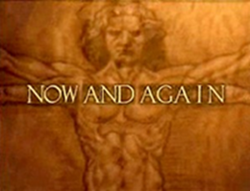Brainpower is a Dutch musician.
Brainpower, BrainPower, or Brain Power may also refer to:
Contents
Hit song on the streaming platform, Twitch, in the platforms earlier days.
Brainpower is a Dutch musician.
Brainpower, BrainPower, or Brain Power may also refer to:
Hit song on the streaming platform, Twitch, in the platforms earlier days.
Body may refer to:

Bender Bending Rodríguez is one of the main characters in the animated television series Futurama. He was conceived by the series' creators Matt Groening and David X. Cohen, and is voiced by John DiMaggio. He fulfills a comic, antihero-type role in the show, and is described by fellow character Leela as an "alcoholic, whore-mongering, chain-smoking gambler".
A brain is a biological organ.

The 4400 is a science fiction television series produced by CBS Paramount Network Television in association with BSkyB, Renegade 83, and American Zoetrope for USA Network in the United States and Sky One in the United Kingdom. It was created and written by Scott Peters and René Echevarria, and it starred Joel Gretsch and Jacqueline McKenzie. The series ran for four seasons from July 11, 2004, to September 16, 2007.

Captain N: The Game Master is an animated television series that aired on NBC from 1989 to 1991 as part of its Saturday morning cartoon lineup. Produced by DIC Animation City, it incorporated elements from video games of the time by Japanese company Nintendo. There was also a comic book adaptation by Valiant Comics.
The face is a part of the body, the front of the head.

Now and Again is an American science fiction comedy-drama television series created by Glenn Gordon Caron that aired on CBS from September 24, 1999 until May 5, 2000. The story revolves around the United States government engineering the perfect human body for use in espionage, but not being able to perfect the brain. In an attempt to get the project up and running, they take the brain of overweight family man Michael Wiseman, who is killed in a train accident.

Brainpower is a Dutch rapper. Born in Belgium, he grew up in the Netherlands. He has released six studio albums since 1990.

Captain Power and the Soldiers of the Future is a science fiction-action television series, merging live action with animation based on computer-generated images, that ran for 22 episodes in Canadian and American syndication. A toy line was also produced by Mattel, and during each episode there was a segment that included visual and audio material which interacted with the toys. A production of Landmark Entertainment Group, Captain Power and the Soldiers of the Future was created by Gary Goddard and Tony Christopher, and developed by Marc Scott Zicree, with J. Michael Straczynski becoming de facto head writer. Plans to bring the series back, set 28 years after the first series, were announced in July 2016. Goddard Film Group, headed by one of the original series co-creators, Gary Goddard, was one of the development teams working on the new series.

Brain Powerd is a Japanese anime television series created by Sunrise. It was directed and written by Gundam creator Yoshiyuki Tomino and features mecha designs by Mamoru Nagano, character designs by Mutsumi Inomata, and music by Yoko Kanno. The 26 episodes of the series originally premiered on the satellite channel WOWOW between April and November 1998. The series was also aired across Japan on the anime network Animax, which also later broadcast the series across its respective networks worldwide, including its English language networks in Southeast Asia and South Asia. Animax aired Bandai Entertainment's localization, the series' English language television premiere. The anime series was licensed by Bandai and distributed across the region on DVD under the title Brain Powered.

The Adventures of the Galaxy Rangers is an American animated space Western television series created by Robert Mandell and produced by Transcom Media, Inc. and Gaylord Entertainment Company. It was broadcast in syndication between 1986 and 1989. The series combines sci-fi stories with traditional wild west themes. It is one of the first anime-style shows produced mainly in the United States, although the actual animation was done by the Japanese animation studio Tokyo Movie Shinsha. At the time it aired, The Adventures of the Galaxy Rangers was considered a revolutionary children's show.
Abandon, abandoned, or abandonment may refer to:

Once Upon a Time... Life is an educational animated television series created and directed by Albert Barillé. It is the third series in the Once Upon a Time... franchise. It reprises the main characters from its predecessors, Once Upon a Time... Man and Once Upon a Time... Space, and adapts them into a physiology context, talking about the human body and its functions in a simplified and educational way. The series consists of 26 episodes.
No-Brainer or No Brainer may refer to:

Human Body: Pushing the Limits is a four part television documentary series which was filmed in various locations across the globe and premiered on the Discovery Channel on March 2, 2008 in North America. The first two episodes aired March 2, and the final two aired March 9 at 9:00 p.m. and 10:00 p.m. E.S.T.

The ten-percent-of-the-brain myth or ninety-percent-of-the-brain myth states that humans generally use only one-tenth of their brains. It has been misattributed to many famous scientists and historical figures, notably Albert Einstein. By extrapolation, it is suggested that a person may 'harness' or 'unlock' this unused potential and increase their intelligence.

Pinky and the Brain is an American animated sitcom created by Tom Ruegger for the Kids' WB programming block of The WB, as a collaboration of Steven Spielberg with his production company Amblin Entertainment and Warner Bros. Television Animation. This was the first animated television series to ever be presented in Dolby Surround. The characters first appeared in 1993 as a recurring segment on the animated television series Animaniacs. It was later spun off as a series due to its popularity, with 65 episodes produced. The characters later appeared in the series Pinky, Elmyra & the Brain, and later returned to their roots as an Animaniacs segment in the 2020 revival of that series.
The Human Body is an eight-part documentary series, first shown on 20 May 1998 on BBC One and presented by medical scientist Robert Winston. A co-production between the BBC and The Learning Channel, the series looks at the mechanics and emotions of the human body from birth to death.
Body swaps, first popularized in Western Anglophone culture by the personal identity chapter of John Locke's Essay Concerning Human Understanding, have been a common storytelling device in fiction media. Novels such as Vice Versa (1882) and Freaky Friday (1972) have inspired numerous film adaptations and retellings, as well as television series and episodes, many with titles derived from "Freaky Friday". In 2013, Disney Channel held a Freaky Freakend with seven shows that featured body-swapping episodes. This list features exchanges between two beings, and thus excludes similar phenomena of body hopping, spirit possession, transmigration, and avatars, unless the target being's mind is conversely placed in the source's body. It also excludes age transformations that are sometimes reviewed or promoted as body swaps, as in the movies Big and 17 Again; identity/role swaps, typically between clones, look-alikes, or doppelgängers; and characters with multiple personalities.
Brain Games is an American popular science television series that explores cognitive science by focusing on illusions, psychological experiments, and counterintuitive thinking. The series debuted on National Geographic in 2011 as a special. Its return as an original series in 2013 set a record for the highest premiere rating for any National Geographic original series with 1.5 million viewers.